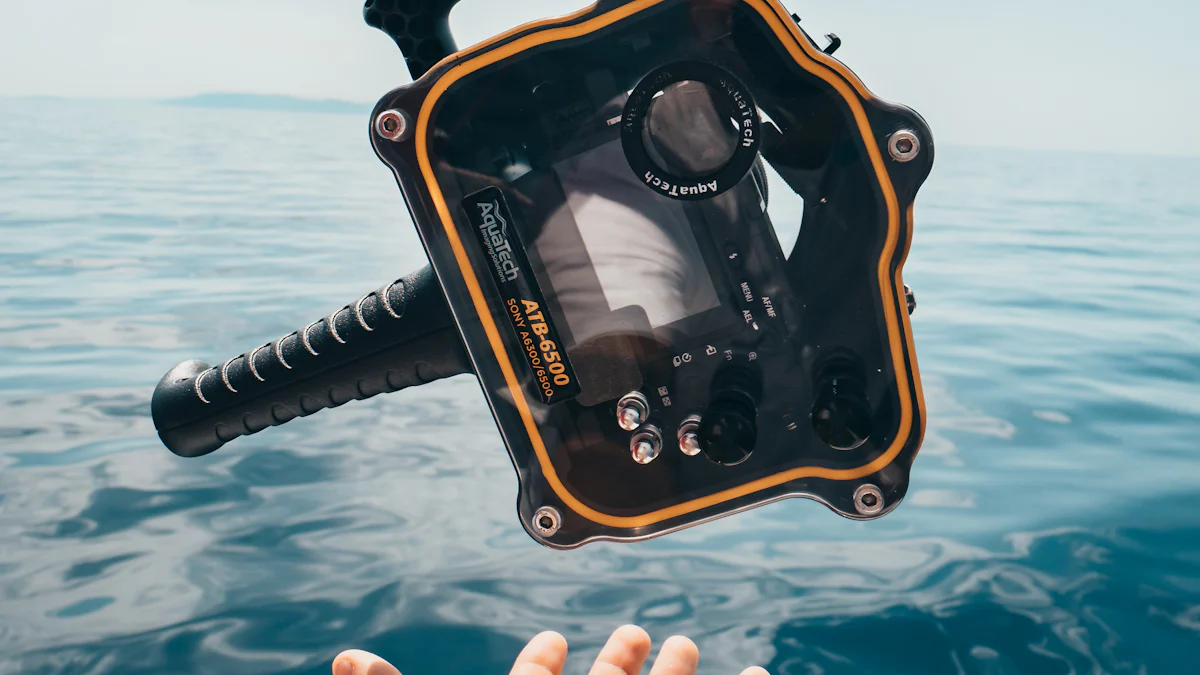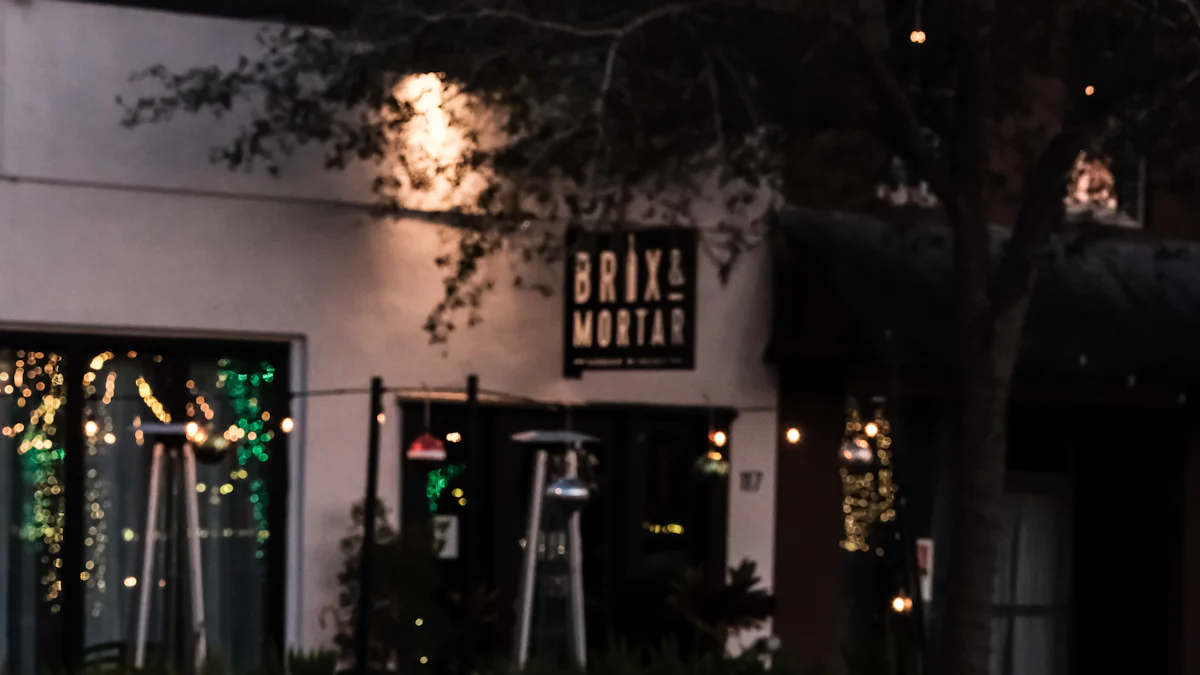Mil-spec flashlights for extreme conditions

In extreme conditions, dependable lighting can mean the difference between safety and danger. You need tools that perform under pressure, and flashlights built to military specifications (Mil-spec) deliver exactly that. These flashlights are designed to withstand harsh environments, offering unmatched durability and brightness. Whether you face rugged terrain, severe weather, or complete darkness, these tools adapt to your needs. Their robust construction ensures they endure impacts, water exposure, and other challenges. When reliability matters most, Mil-spec flashlights provide the confidence you need to navigate any situation.
Key Takeaways
Mil-spec flashlights are made to handle tough conditions. They work well in harsh places.
Check for high brightness, adjustable modes, and waterproof designs. These help save power and work in wet areas.
Think about the material. Strong aluminum is durable and resists damage.
Pick rechargeable or disposable batteries. Rechargeable ones save money over time.
Lightweight flashlights are good for daily use. Heavier ones are better for tough tasks.
What Are Mil-spec Flashlights?
Definition and Purpose
Mil-spec flashlights, also called tactical flashlights, are designed for extreme durability and performance. These tools are built to handle harsh conditions and heavy impacts. Unlike standard flashlights, they meet strict standards set by the U.S. Department of Defense. This ensures they perform reliably under pressure. Military and law enforcement professionals trust these flashlights because of their ability to function in critical situations.
The term "MIL-SPEC" stands for "Military Specification." It indicates that these flashlights meet specific requirements for durability and reliability. This sets them apart from regular flashlights, which may not survive the same level of stress or environmental challenges.
How Mil-spec Standards Ensure Durability
Mil-spec flashlights are engineered to last. Their construction often includes materials like aircraft-grade aluminum, which resists damage from drops or impacts. These flashlights undergo rigorous testing to ensure they can withstand extreme temperatures, water exposure, and rough handling.
The durability of these flashlights makes them ideal for demanding environments. Whether you are navigating rugged terrain or working in wet conditions, you can rely on their robust design. Their ability to endure tough situations ensures they remain functional when you need them most.
Common Uses for Tactical Flashlights
You will find Mil-spec flashlights used in various professions and scenarios:
Night Security Guard: A reliable flashlight is essential for routine rounds and responding to emergencies like break-ins.
Mechanic: Bright and durable flashlights help illuminate complex engine systems during repairs.
Outdoor Enthusiast: Hikers and campers depend on these flashlights for navigating trails and ensuring safety in the wilderness.
First Responders: Firefighters and paramedics use them to operate effectively in low-light or hazardous conditions.
These flashlights are not just tools; they are lifesavers in extreme situations. Their durability and performance make them indispensable for professionals and adventurers alike.
Key Features to Look For

Durability and Build Quality
Impact Resistance
When you’re in extreme conditions, your flashlight must survive accidental drops or rough handling. Mil-spec flashlights excel in impact resistance, often withstanding falls from heights of up to 2 meters. This durability ensures your flashlight remains functional even in high-stress situations. Whether you’re hiking rocky trails or working in hazardous environments, you can trust these tools to endure the unexpected.
Material Composition
The materials used in Mil-spec flashlights play a critical role in their resilience. Many models feature aircraft-grade aluminum, a lightweight yet incredibly strong material. This composition resists corrosion and damage, making it ideal for harsh environments. Some flashlights also include anodized finishes, which add an extra layer of protection against wear and tear. These materials ensure your flashlight performs reliably, no matter the conditions.
Brightness and Lumens
Importance of Lumens in Extreme Conditions
Brightness is a key factor when choosing a flashlight for extreme scenarios. Lumens measure the total light output, and higher lumens mean brighter light. For tactical missions or search-and-rescue operations, flashlights with a lumen output of 1,200 lumens or more are recommended. If you need to illuminate objects at a distance, look for a flashlight with at least 600 meters of ANSI FL1 rated throw. For even greater visibility, models with 800 meters or more are preferable.
Adjustable Brightness Levels
Not every situation requires maximum brightness. Flashlights with adjustable brightness levels give you control over the lumen output, allowing you to conserve battery life when full power isn’t necessary. This feature is especially useful during extended use, such as overnight camping trips or long rescue missions. You can switch between modes to adapt to your specific needs, ensuring optimal performance in any scenario.
Waterproofing and Weather Resistance
IP Ratings Explained
Waterproofing is essential for flashlights used in extreme weather or wet environments. IP ratings (Ingress Protection) indicate how well a flashlight resists water and dust. For example:
IP68: Fully protected against dust and submersion in water beyond 1 meter for extended periods.
IPX7: Can handle temporary immersion in water up to 1 meter for 30 minutes.
IPX8: Designed for deeper submersion, as specified by the manufacturer.
These ratings help you choose a flashlight that matches your environment, whether you’re facing heavy rain or underwater challenges.
Performance in Rain, Snow, and Underwater
Mil-spec flashlights are built to perform in all weather conditions. Models with IP68 ratings can handle heavy rain, snow, and even underwater use without compromising functionality. This makes them ideal for outdoor adventures, marine activities, or emergency situations. You can rely on these flashlights to provide consistent lighting, no matter how harsh the environment becomes.
Battery Life and Power Options
Rechargeable vs. Disposable Batteries
Choosing the right power source for your flashlight depends on your needs. Rechargeable batteries offer several advantages:
They provide higher power capacity, making them ideal for high-drain flashlights.
Over time, they save money compared to disposable options.
Their longer lifespan makes them more environmentally friendly.
However, rechargeable batteries come with some drawbacks. They require access to electricity for recharging, which can be a challenge during power outages or in remote areas. They may also have a higher upfront cost and can be bulkier than disposable batteries.
Disposable batteries, on the other hand, are easy to replace and widely available. They are convenient for emergencies when recharging isn’t an option. However, their long-term cost is higher, and they generate more waste.
Battery Type | Advantages | Considerations |
|---|---|---|
Rechargeable | Cost-effective, eco-friendly | Requires charging infrastructure |
Disposable | Readily available, easy to replace | Higher long-term cost |
Runtime Considerations for Emergencies
In emergencies, you need a flashlight with a reliable runtime. Flashlights with adjustable brightness levels help conserve battery life. For example, using a lower lumen output during non-critical moments extends runtime. High-lumen flashlights often drain batteries faster, so balancing brightness with battery efficiency is crucial. Always carry spare batteries or a portable charger to ensure your flashlight remains operational when you need it most.
Additional Features
Tactical Modes (e.g., Strobe, SOS)
Modern flashlights often include multiple modes to enhance their versatility. Strobe mode can disorient threats, giving you a tactical advantage in self-defense situations. SOS mode is invaluable for signaling distress during emergencies. Some flashlights also feature signal modes for long-distance communication. These modes make your flashlight more than just a lighting tool—it becomes a critical survival device.
Ergonomics and Portability
A well-designed flashlight should be easy to carry and use. Compact models are perfect for everyday carry (EDC), fitting comfortably in your pocket or bag. Features like a magnetic base or clip allow hands-free operation, which is useful for tasks requiring both hands. Some flashlights include an impact bezel for breaking glass or self-defense. A lockout function prevents accidental activation, conserving battery life. These ergonomic and portable designs ensure your flashlight is always ready when you need it.
Top Mil-spec Flashlights for Extreme Conditions

Flashlight 1: SureFire G2X Pro
Key Features
The SureFire G2X Pro stands out as one of the best tactical flashlights for extreme conditions. Its lightweight polymer body ensures durability without adding unnecessary weight. With a maximum output of 600 lumens and a beam intensity of 8,700 candela, this flashlight provides reliable brightness for various scenarios. It features an IPX7 waterproof rating, making it suitable for wet environments. The flashlight operates on two 123A batteries, offering a runtime of 1.5 hours. Its compact length of 5.2 inches makes it easy to carry, while the click tailcap switch ensures quick and intuitive operation.
Feature | Detail |
|---|---|
Max Output | 600 lumens |
Beam Intensity | 8,700 candela |
Runtime | 1.5 hours |
Body Material | Tough, lightweight polymer |
Ingress Protection | IPX7 |
Length | 5.2 in (13.2 cm) |
Switching | Click tailcap |
Batteries | Two 123A (included) |
Pros and Cons
Pros:
Lightweight and durable design.
Waterproof for up to 1 meter of submersion.
Compact and portable.
Cons:
Limited runtime compared to other tactical flashlights.
Fixed brightness levels may not suit all needs.
Flashlight 2: Streamlight ProTac HL-X
Key Features
The Streamlight ProTac HL-X is a versatile tactical torch designed for high-performance lighting. It delivers a powerful 1,000-lumen output, making it ideal for search-and-rescue missions or outdoor adventures. Its dual-fuel capability allows you to use either rechargeable 18650 batteries or disposable CR123A batteries, ensuring flexibility in power options. The flashlight features a durable aluminum body with an anodized finish, providing excellent impact resistance. Its IPX7 waterproof rating ensures reliable performance in wet conditions. The ProTac HL-X also includes multiple lighting modes, such as high, low, and strobe, for added functionality.
Pros and Cons
Pros:
High brightness and long beam distance.
Dual-fuel capability for flexible power options.
Durable and weather-resistant construction.
Cons:
Slightly heavier than other tactical flashlights.
Higher cost compared to basic models.
Flashlight 3: Fenix PD36R
Key Features
The Fenix PD36R is a premium tactical torch that excels in both performance and durability. With a maximum output of 1,700 lumens and a beam distance of 396 meters, it provides exceptional brightness and range. This flashlight offers five brightness levels and a strobe mode, allowing you to adapt to various situations. Its runtime of up to 482 hours ensures reliability during extended use. The flashlight features a USB Type-C charging port for fast and convenient recharging. Constructed from A6061-T6 aluminum, it withstands harsh conditions with ease. Fenix also backs this flashlight with a limited lifetime guarantee.
Feature | Fenix PD36R V2.0 |
|---|---|
Maximum Output | 1700 lumens |
Beam Distance | 1299 feet (396 meters) |
Runtime | 482 hours |
Lighting Modes | 5 brightness levels + strobe |
LED Type | Luminus SFT40 LED |
Charging | USB Type-C, up to 18W |
Construction Material | A6061-T6 aluminum |
Warranty | Limited Lifetime Guarantee |
Pros and Cons
Pros:
Exceptional brightness and long runtime.
Fast USB Type-C charging.
Durable construction with a lifetime guarantee.
Cons:
Higher price point.
Slightly larger size compared to other tactical flashlights.
Tip: If you need a flashlight with a balance of brightness, durability, and runtime, the Fenix PD36R is an excellent choice for both professionals and outdoor enthusiasts.
Flashlight 4: Olight Warrior X Pro
Key Features
The Olight Warrior X Pro stands out as a powerhouse among tactical flashlights, designed for extreme conditions. Its impressive features include:
A high lumen output of 2,250 lumens, capable of illuminating distances up to 600 meters.
A durable aluminum alloy body with an IPX8 waterproof rating, ensuring it performs in wet and rugged environments.
The ability to withstand drops from heights of up to 3 meters, making it highly impact-resistant.
This tactical torch combines brightness, durability, and reliability, making it one of the best tactical flashlights for outdoor adventures, search-and-rescue missions, and emergency preparedness.
Pros and Cons
Pros:
Exceptional brightness and long beam throw.
Rugged construction that handles tough conditions.
Waterproof and impact-resistant design.
Cons:
Slightly heavier than other tactical flashlights.
Limited runtime at maximum brightness.
The Olight Warrior X Pro is an excellent choice if you need a flashlight that delivers powerful illumination and can endure extreme environments.
Flashlight 5: Nitecore P20i
Key Features
The Nitecore P20i is a versatile tactical torch that balances performance and practicality. It offers a maximum output of 1,800 lumens, providing a clean and focused beam. Its USB-C charging capability ensures quick and convenient recharging, while its solid aluminum construction enhances durability. The flashlight also includes two user interface (UI) options, allowing you to customize its operation based on your needs. With a 365nm UV light and a range of available accessories, the P20i is a well-rounded tool for tactical and everyday use.
Pros and Cons
Pros | Cons |
|---|---|
Solidly built | Timed ramp-down |
Very bright | UV in normal mode rotation |
Good beam | Questionable clip and lanyard |
Two UI choices | Proprietary battery |
USB-C charging | No shortcut to low |
Great kit and available accessories | |
365nm UV light |
The Nitecore P20i receives high praise from users. Gabriel rated it 4.5 stars, highlighting its build quality and clean beam. Owen gave it 5 stars, noting improvements like USB-C charging and its suitability for long-term use. While it has minor drawbacks, its versatility and performance make it one of the best tactical flashlights for professionals and enthusiasts alike.
How to Choose the Right Flashlight for Your Needs
Assessing Your Environment
Indoor vs. Outdoor Use
Your environment plays a significant role in selecting the right flashlight. For indoor use, you may prioritize compact designs and moderate brightness levels. These features make it easier to navigate tight spaces or perform tasks like fixing appliances. Outdoor use, however, demands more robust tactical flashlights. You need higher brightness levels and longer beam distances to illuminate large areas or trails. Outdoor environments also require flashlights with strong impact resistance and waterproofing to handle rugged conditions.
Specific Challenges (e.g., Extreme Cold, Wet Conditions)
Extreme environments demand specialized features. In cold weather, batteries tend to drain faster. You should choose a flashlight with a reliable power source, such as rechargeable lithium-ion batteries, which perform better in low temperatures. Wet conditions require flashlights with high water resistance. Look for models with IP68 ratings to ensure they function even when submerged. These features guarantee your flashlight remains dependable in challenging scenarios.
Prioritizing Features Based on Use Case
Tactical Use vs. General Use
Your intended use determines the features you should prioritize. Tactical use often requires:
High brightness levels for specific applications.
Momentary-on and constant-on options for operational flexibility.
Durable designs to withstand rough handling.
General users, on the other hand, focus on basic functionality and convenience. You may not need advanced features like strobe modes or extreme brightness. Instead, prioritize ease of use and portability.
Importance of Portability and Weight
A flashlight’s portability and weight affect its usability. For everyday carry, compact and lightweight models are ideal. They fit easily in your pocket or bag, ensuring you always have light when needed. Tactical flashlights, while often heavier, provide enhanced durability and performance. If you need a tactical torch for extended use, consider one with a balanced design that doesn’t compromise comfort.
Budget Considerations
Balancing Cost with Quality
High-quality Mil-spec flashlights come at a range of prices. While standard flashlights cost under $50, Mil-spec models range from $43 to over $500. Investing in a higher-quality flashlight ensures better performance and durability. You should evaluate your needs and choose a model that offers the best value within your budget.
Long-term Value of Mil-spec Flashlights
Mil-spec flashlights provide long-term value. Their robust construction and advanced features reduce the need for frequent replacements. Over time, this saves you money compared to cheaper, less durable options. Additionally, their reliability in emergencies makes them a worthwhile investment for both tactical use and general applications.
Mil-spec flashlights are essential tools for extreme conditions. Their durability, brightness, and adaptability ensure you can rely on them in critical situations. When selecting a flashlight, prioritize features that enhance functionality and safety.
Feature | Benefit |
|---|---|
Disorients threats and signals for help | |
SOS/Signal Modes | Enables communication in emergencies |
Impact Bezel | Breaks glass or serves as a self-defense tool |
Lockout Function | Prevents accidental activation and conserves battery life |
Magnetic Base/Clip | Provides hands-free lighting for convenience |
The Fenix PD36R stands out as the best overall flashlight for general use. Its robust build quality and simple interface make it a reliable tool for various applications. With a maximum output of 1,700 lumens and a beam distance of nearly 1,300 feet, it combines power and functionality. The dedicated mode button and long-lasting beam enhance usability, making it perfect for tactical and everyday needs.
FAQ
What makes a flashlight "Mil-spec"?
Mil-spec flashlights meet strict military specifications for durability and performance. They use high-quality materials like aircraft-grade aluminum and undergo rigorous testing. These flashlights excel in extreme conditions, offering reliability in harsh environments.
How do I maintain my Mil-spec flashlight?
Clean your flashlight regularly with a soft cloth to remove dirt. Check the battery compartment for corrosion. Store it in a dry place. For rechargeable models, charge the battery fully before storage to maintain optimal performance.
Can a high-output tactical flashlight be used for everyday tasks?
Yes, you can use a high-output tactical flashlight for everyday tasks. Its brightness and durability make it versatile for home repairs, outdoor activities, or emergencies. However, its advanced features may exceed the needs of casual users.
Are rechargeable batteries better for Mil-spec flashlights?
Rechargeable batteries work well for frequent use. They save money over time and reduce waste. However, disposable batteries are more convenient for emergencies when recharging isn’t possible. Choose based on your usage and environment.
How do I choose the right flashlight for extreme cold?
For cold conditions, select a flashlight with lithium-ion batteries. These batteries perform better in low temperatures. Ensure the flashlight has a durable, weather-resistant design to handle freezing environments.
See Also
Engineered for Longevity: Our Emergency Flashlight's Resilience
Helius Tactical Flashlight: Lighting Up Your Outdoor Journeys
Discover Your Ideal Flashlight for Daily Use
SF1 Camping Flashlight: Brighten Your Wilderness Experiences
